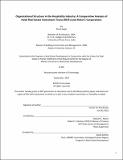Organizational structure in the hospitality industry : a comparative analysis of hotel real estate investment trusts (REITs) and hotel C-Corporations
Author(s)
Gujar, Purva (Purva Prakash)
DownloadFull printable version (2.819Mb)
Other Contributors
Massachusetts Institute of Technology. Center for Real Estate. Program in Real Estate Development.
Advisor
Stewart C. Myers.
Terms of use
Metadata
Show full item recordAbstract
Current legislation has made it possible for real estate investment trusts (REITs) to earn income beyond purely passive sources such as rents from real property or interest from mortgages on real property. As a result, both the number and market capitalization of hotel REITs have substantially increased, and the difference between hotel REITs and hotel C-corporations has narrowed. However, companies such as Starwood Hotels have reverted back to the C-corporation structure. Given these organizational changes and the increasing dominance of hotel REITs, there is a need to analyze hotel REITs and hotel C-corporations in a comparative framework. Equity REITs and C-corporations have been studied extensively. However, research on various organizational forms in the hospitality industry is somewhat limited. This study attempts to fill this gap by comparing the stock market performance of publicly traded hotel REITs with hotel C-Corporations from 1993 to 2011. Furthermore, the impact of significant events such as mergers and acquisitions and legislative amendments on firms' stock price are also observed. Finally, detailed case studies of companies that underwent corporate restructuring are conducted. The research objective of this thesis is to examine (a) whether REITs are an efficient organizational structure for the lodging industry; and (b) whether the tax benefits of REITs offset the regulatory constraints they face. The study infers that REIT acquirers have an advantage in mergers and acquisitions, but in all other situations, the net benefits of REITs are not as clear. On market cap basis, the performance of hotel REITs and hotel C-Corporations was almost identical, however when equally weighted, hotel REITs outperformed their C-Corporation counterparts. In addition, the results show that the REIT returns are highly volatile. On a broad level the hospitality business has two distinct segments -- ownership of hotels and management of hotels and the degree of operating flexibility offered is one of the main factors that differentiate REITs from the C-Corporation counterparts. Therefore, this study concludes that the choice of corporate structure depends greatly on a firm's business strategy.
Description
Thesis (S.M. in Real Estate Development)--Massachusetts Institute of Technology, Program in Real Estate Development in Conjunction with the Center for Real Estate, 2012. Cataloged from department-submitted PDF version of thesis. This electronic version was submitted and approved by the author's academic department as part of an electronic thesis pilot project. The certified thesis is available in the Institute Archives and Special Collections. Includes bibliographical references (p. 102-108).
Date issued
2012Department
Massachusetts Institute of Technology. Center for Real Estate. Program in Real Estate Development.; Massachusetts Institute of Technology. Center for Real EstatePublisher
Massachusetts Institute of Technology
Keywords
Center for Real Estate. Program in Real Estate Development.